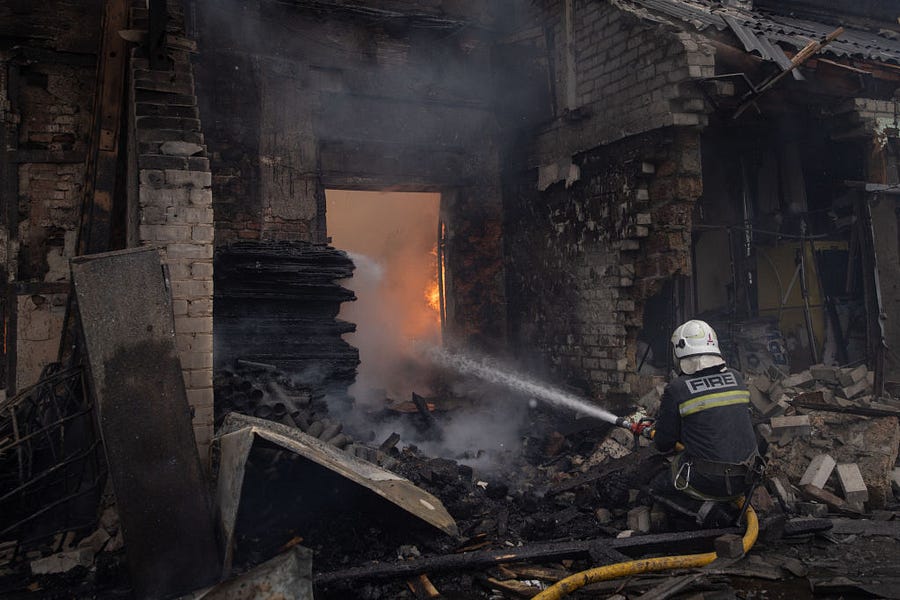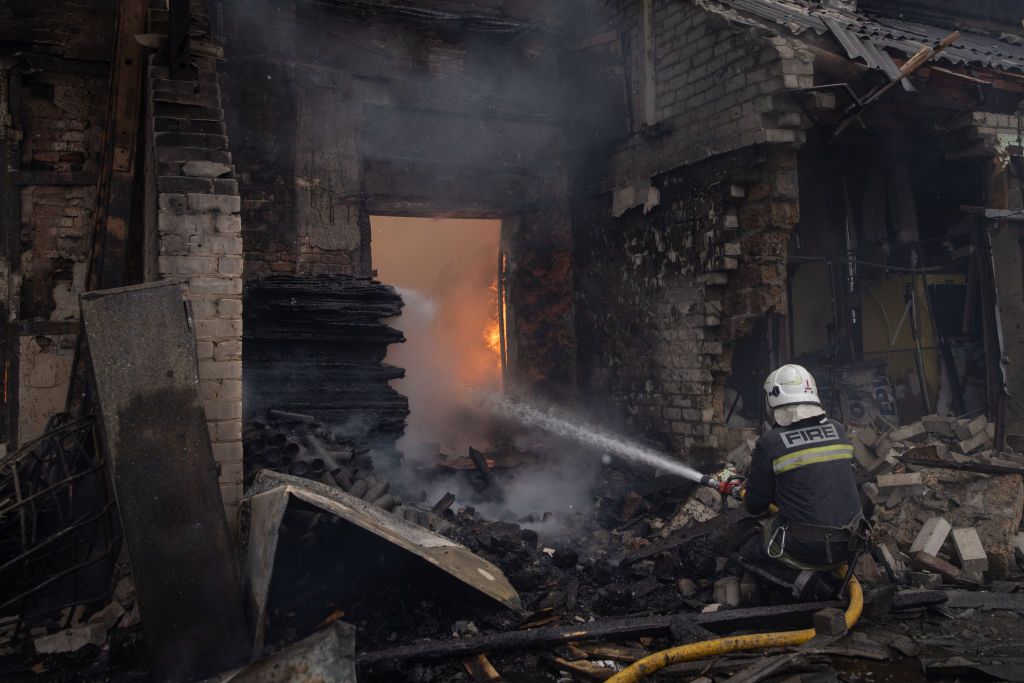Saving Ukraine vs. Defeating Russia
A month into the invasion, these two goals look the same. Biden's regime-change line is a reminder of how divergent they are.



Edited by Sam Thielman
LET'S EXTEND the benefit of the doubt to President Biden. Let’s take him at his administration's word that his line in Poland on Saturday about how Vladimir Putin "cannot remain in power" was an ad lib that went off the rails. There are very real escalatory pressures contained in Biden's reaction to the Russian invasion of Ukraine, but a different president could easily have launched a no-fly zone—or, for that matter, made the weapons pipeline contingent on a personal favor—while Biden appears attentive to not NATOizing the war.
Even then, it's hard to overstate how irresponsible it is to threaten a nuclear power with regime change. A wizened foreign-policy hand like Biden—who can remember the balance of nuclear terror in a manner that people my age and younger can't—needs to know better than flirting with knocking off the president of Russia. Putin is by all accounts highly attentive to the three regime changes (and two attempts) that Washington has pursued during his tenure atop the Russian state. On the other hand, a wizened foreign-policy hand like Biden should also know better than to pursue a Cold War against China and a Cold War against Russia, because that's how you get unforced errors like the February 4 Declaration.
Accidental or deliberate, Biden's mistake clarifies an important distinction. The U.S. is on a strategic path that's set to split (if it hasn't already). One direction we can call Saving Ukraine. The other we can call Defeating Russia. Superficially, these two strategies look the same, since the war is a binary conflict—and we should hope it stays that way—between Russia and Ukraine. But Biden's remarks are a reminder that the second path can appear to policymakers more alluring than the first.
FOREVER WARS is part of the Discontents Substack cartel, and with cartelization comes benefits. Subscribe to Forever Wars for a year and receive six FREE months of two of our affiliated newsletters, Welcome To Hell World by Luke O’Neil and Derek Davidson’s Foreign Exchanges. Both of them are excellent, and you’ll get them both at the subscriber tier. Subscribe today! And remember: REIGN OF TERROR is on sale!
SAVING UKRAINE is shorthand, but basically it means stopping the invasion, getting Russia out, restoring the Feb. 25 status quo, that kind of thing. I have neither the power nor the desire to set a negotiating position for Ukrainians who have to suffer through the devastation of war. But the Saving-Ukraine rubric means an end to the war, whether through a negotiated settlement, a battlefield victory or a combination of costs and concessions sufficient to make Russia abandon its current course of destruction. Before he was CIA director, Bill Burns famously warned Secretary of State Condoleezza Rice that Putin's fears about Ukraine falling into the NATO orbit were broadly shared by "the Russian elite." In that respect, it seems significant that Volodymyr Zelensky is talking on Monday about formally adopting a neutral alignment, bandwagoning with neither Russia nor NATO.
Defeating Russia is also shorthand, but it aims past Ukraine. A regime change in Russia of the sort that Biden alluded to says nothing, in and of itself, about Ukraine. And there are several Defeat-Russia pursuits short of regime change. One is an economic devastation of Russia that can outlast the precipitating event of aggression against Ukraine, as Esfandyar Batmanghelidj has observed about similar sanctions regimes. Another is an expanded NATO, which thankfully seems off the table, or expanded mobilization among member states bordering Russia. The “Defeat Russia” strategy’s policies are aimed at Russia-qua-Russia, with the goal of inflicting sufficient pain to force Russia to abandon its current geopolitical course, of which the invasion of Ukraine is a tributary. If that's vague, it's because there's a lot of different things that can mean.
The most important thing to recognize about a Defeat-Russia strategy is that it sacrifices Ukraine in the name of saving it. That means the strategy expands the war inside Ukraine beyond its current lines of military operations and/or prolongs it. Weapons pipelines, a dangerous strategy that has more support than I expected, are really good at prolonging conflict in pursuit of tipping the military balance among combatants. That’s one way a Save-Ukraine tactic can fuel a Defeat-Russia strategy, if those directing it permit drift. And beyond that, if Putin thinks Biden defines the stakes of the Ukraine war as the end of his regime, why would Putin stop?
Already, unchastened Iraq invasion advocates like Eliot Cohen are quoting gangster movies about how you need to put one of their guys in the morgue when they put one of your guys in the hospital. It is easy to see Ukraine becoming a battlefield upon which its supposed allies will be eager to fight to the last Ukrainian so long as it means deepening Putin’s chosen quagmire. Same goes for Biden describing the war as a "new battle for freedom" while standing on the soil of Poland, whose current government is the scene of substantial democratic backsliding of its own. Then there's America's own retreat from even the flimsy bourgeois democracy we've had since 1965. Atlanticist America is really high on its own supply at the moment.
I suspect that the underperformance (thus far!) of the Russian military in Ukraine, combined with the understandable emotional sympathies for Ukrainians resisting invasion in the face of death—as well as a restored sense of innocence from not being the aggressor for a change—has given some observers a sense that Putin’s defeat is inevitable. I hope for the sake of Ukrainians that this perspective manifests reality.
But a lot of very unhappy experiences, with Syria an unignorable case, show that protracted conflict is full of battlefield reversals, even in overall conditions of stalemate. Putin may indeed be unable to win: the hard part is holding Ukraine and Russia isn't out of the conquering stage. But Putin’s loss is not the same thing as Ukrainians’ survival. Frustrated aggressors in disciplined militaries do things like the Haditha massacre or the Bales mass-murder. The best way to avert these sorts of atrocities or battlefield reversals is to stop the war before the conflict entrenches itself.
Reaching for an imprecise analogy: Iran's strategy during the U.S. occupation of Iraq could be considered Defeat America rather than Save Iraq. Iran, at the very least, facilitated a weapons pipeline of explosively formed penetrators—super IEDs—that had zero hope of ousting the U.S. from Iraq. But they were extremely good at killing American soldiers and marines. They raised the cost of the occupation tremendously, and created an escalatory pressure on the U.S. to respond to Iran. Ominously for its implications for Russia-Ukraine, U.S. resolve to maintain the Iraq surge increased in response. None of this was any benefit at all to Iraqis. All of it looked past the Iraqis who bore the burden of the war.
Friday's statements that Russia will refocus its war on controlling Russian-heavy eastern Ukraine have attracted a lot of skepticism. I have zero ability to adjudicate what's misdirection and what's refocus, and the battlefield will reveal the truth soon enough. But if they're an indication that elements within the Kremlin recognize that Putin has launched his own Iraq War, then the right course of action is to aggressively pursue diplomacy toward a ceasefire, then a withdrawal, and then something like an accord. There is still time to Save Ukraine. Trying to Defeat Russia will squander it.
I KNOW, I KNOW, this is like my third newsletter about the Ukraine conflict after I said I wouldn't Discourse about it. But hear me out: posts like these do not purport to cover the conflict. They're making observations about American strategy. Am I drawing a bullshit distinction because I made a public commitment that events compel me not to honor? That's obviously for you to judge and not me. But I'm really trying not to pretend I have any Russia-Ukraine expertise while very occasionally feeling like there are aspects of my expertise that might lead to a salient observation or two. As always, read journalists who are on the ground in Ukraine. They will be better guides to keeping you informed about the conflict than journalism, especially mine, that isn't.
THIS EDITION OF THE NEWSLETTER fleshes out a random thought I expressed to my former boss Peter Beinart for a recent conversation he asked me to have for his subscribers. One of them made a salient criticism of my objection to the Ukraine weapons pipeline: the proliferation risk of arming a national military with demonstrated command-and-control (Ukraine) is not as great as arming factional militias (Syria, per my analogy). I take that point, and observe that the Ukrainian state is experiencing substantial pressures on its cohesion that increase with the duration of the invasion/occupation. Plus we know from our own experience in the War on Terror that shit falls off the backs of trucks in war all the time.
SPEAKING OF, SAM TELLS ME that this edition is our 76th. Seventy-six newsletters since July 20! If FOREVER WARS were New Mutants, we would be past Inferno. That's wild. Thanks for being here. Pay for it if you don't already!

